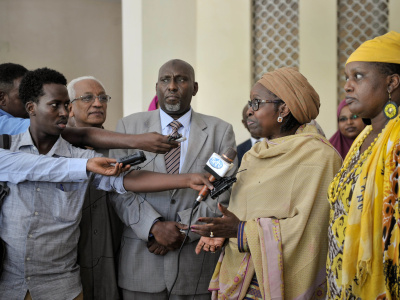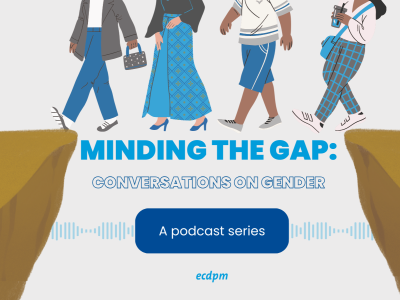
International Women’s Day: How we aim to put gender at the heart of our work
Sara Gianesello and Sophie Desmidt explain why it’s crucial for organisations to incorporate gender equality at different levels. They delve into how ECDPM has worked to achieve this, the challenges and what we learned.
This commentary is gender transformative. 
This year, International Women's Day feels more urgent than ever. With feminist foreign policies losing political momentum and funding for gender equality declining, the UN has called on governments to act now to build a feminist future where equal rights, power and opportunity exist for everyone, leaving no one behind and investing in the next generations. But with more far-right authoritarian parties and leaders taking power in Europe and elsewhere, what will be next for women’s rights and gender equality?
After a decade of increase in funding for gender equality, official development assistance (ODA) from OECD Development Assistance Committee (DAC) countries dropped for the first time in 2021-2022. This decline is expected to continue due to the global backlash against gender equality and women’s rights, fueled by the rise of authoritarianism and nationalist agendas. Research shows that patriarchy and authoritarianism are interconnected, both rooted in conservative, sexist societal structures with rigid gender roles, a connection exploited by far-right parties to advance their agendas and reduce funding for gender equality. Additionally, geopolitical and geoeconomic shifts are impacting domestic politics, including at the EU level and in European countries, with some EU member states cutting international aid funds. The EU's values agenda is decreasing in prominence, with governance, human rights, gender and humanitarian principles facing growing challenges, both externally and within Europe.
In this increasingly challenging environment, we take the occasion of the International Women’s Day to reflect on our efforts to promote gender equality, the challenges we encountered and the lessons we learned. We also do this as a standing invitation to peer organisations to join us in their reflection, to learn from what worked and what did not work so well, as we renew our commitment to actively monitor and advance gender equality moving forward.
We believe that incorporating gender into our work areas is not only a matter of rights but that applying a gender-sensitive approach also leads to sounder research and stronger evidence.
Our work on gender is cross-cutting, meaning we address gender across all of our activities and our thematic areas of work, ranging from climate change, food security and migration to security, European foreign policy, trade, digital and governance. We believe that incorporating gender into our work areas is not only a matter of rights but that applying a gender-sensitive approach also leads to sounder research and stronger evidence, essential for evidence-based support to sustainable and inclusive international cooperation.
Over time, we have created an internal structure and designated persons (a task force) that support the integration of gender in our research and policy work. For various projects, we have worked with associates specialising in gender. We developed a gender marker aimed at ensuring that gender considerations are integrated into all stages. When projects are designed or underway, or colleagues get stuck or want to extend their approach to gender, the focal points can identify areas to improve.
In September 2022, we launched an internal gender marker to improve the extent to which – and how – gender is addressed throughout our work.
Some of our gender-specific workWhile gender mainstreaming is a key part of our work, we also carried out some gender-specific analyses. For example, we have analysed
|
Some challenges remain…
The pressures on the overall funding environment and shifting priorities with regard to gender have led to a slimming down of opportunities to work on gender-related or gender-focused projects. In practice, our gender focal points juggle between other work responsibilities and accompanying the rest of the staff in meaningfully integrating gender into their research projects.
Limited resources (time, budget, expertise) and limited incentives to mainstream or focus on gender might lead to cases of dilution, meaning that gender considerations might become secondary to other variables or considerations, leading to findings that do not fully capture gender dynamics or inequalities. Finally, without resources to extend training on gender mainstreaming or more advanced practices, such as feminist evaluation techniques, working towards gender equality risks becoming a responsibility of some personally committed individuals instead of a collective effort.
...but some lessons learned help us to adapt and stay focused
In these changing contexts where the gender backlash is more real than ever, we learned some valuable lessons. For example, having clear and practical tools on gender mainstreaming can save time, money and also offer guidance to those who do not necessarily possess the training and expertise on gender equality.
Partnerships and networks are also crucial to amplify voices and share good practices. That is why we organised events, for example with UN Women and UNDP, and launched stand-alone initiatives to explore topics where gender is often overlooked but where inspiring stories emerge, like our podcast 'Minding the gap: Conversations on gender
Clear incentives and endorsement from leadership or senior positions to prioritise gender mainstreaming send a clear message – and provide necessary backstopping. In turn, this enables a conducive environment for gender integration in different research processes.
Additionally, effective monitoring and tracking mechanisms are crucial to track progress and trends, and have provided our teams with important data for joint learning and accountability.
Looking ahead and reaffirming our commitments
Now more than ever, it is crucial to make the case for women’s economic and political empowerment.
Moral arguments for gender equality remain important, but they might no longer be sufficient to address the challenges posed by the backlash against democracy and human rights amidst a context of slashed funds and weakened commitments. Strategically, we will need to take the changing priorities and narratives into account, clearly demonstrating how gender equality aligns with European values but also European and global interests. This means repositioning the narrative around gender equality as essential for democracy, inclusive governance and social cohesion, but also sustainable economic growth, competitiveness, sustainable and inclusive green transition, security, and stability – and investing in initiatives and ways to translate this in evidence-based and politically smart arguments.

For ECDPM this means
We will continue to monitor the EU’s external actions and commitments to gender equality and analyse funding commitments under the next multiannual financial framework (MFF). The 2025 EU commission work programme mentions the publication of a Roadmap for Women’s Rights and new strategies on LGBTIQ and anti-racism. At this stage, it is not clear to what extent this roadmap will apply to external policies as well.
We will analyse how the EU can play a strategic role, even in the current shrinking (funding) environment. In this regard, the dismantling of USAID by President Trump is a game-changer and a key moment that the EU should seize to bolster its partnerships and to present itself as a reliable partner, including in protecting gender equality achievements. The decreasing available funds also means that innovative ways of financing must be sought. For this reason, ECDPM will be present at the conference on Financing for Feminist Futures, organised by the Walking The Talk ahead of the United Nations’ fourth International Financing for Development Conference.
To do this and continuously improve our core work, we will continue to mainstream gender across our work. Strategically, mainstreaming gender is the most cost-effective action we can take: it enables the integration of gender considerations across policy areas where gender equality may not appear central, but that is of interest to the EU and partners. We will also continue to adopt an intersectional lens with the purpose of exploring and advising innovative strategies that continue to promote the empowerment and participation of women and other marginalised communities, such as youth and rural populations.
The views are those of the authors and not necessarily those of ECDPM.





